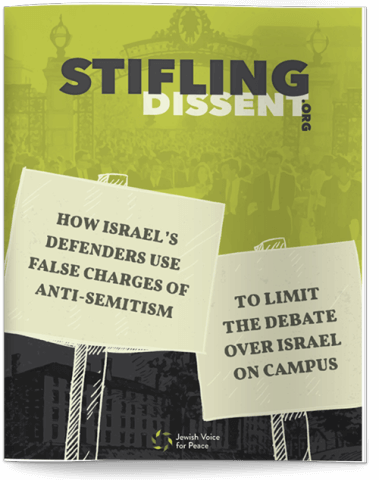On the walls of a central building on my university campus, displayed prominently and with pride, is a historic image of student activists boldly confronting university administration over the school’s complicity in the larger project of U.S. support for the violence and injustice of apartheid South Africa. Those admirable students, likely reprimanded in their own time, today benefit a school that builds its image on the incredible idealism and activism of its students, and a society that has built a better future on the blood, sweat, and tears of ordinary people surviving, thriving, and agitating against an unjust status quo.
Over the last decade, the movement for Palestinian freedom and equality in opposition to continuing illegal settlement and military occupation, devastating assaults on Gaza, and a profoundly unequal political system has increasingly become the focus of coalitional social justice work, especially on college campuses. Like prior movements fighting a status quo of structural violence, this movement faces heavy-handed repression designed to silence marginalized voices and stifle progressive ideas that might chart the path to a better tomorrow. Two recently released reports, one by Jewish Voice for Peace and the other by Palestine Legal and the Center for Constitutional Rights, document this widespread and systematic suppression.
These carefully calculated silencing campaigns deploy unconstitutional ideas like a “civility” exception to the first amendment, backed by a $300 million budget, to silence political speech and eradicate peaceful protest when it challenges a narrowly defined vision of a right-wing, heavily militarized Israel. As a diverse coalition of Palestinian Americans, Muslim Americans, Black Americans, Jewish Americans, labor activists, academics, church groups and many more challenge U.S. complicity in that project, efforts to suppress Palestinian rights advocacy have intensified..
Palestine Legal documented over 300 incidents in just 18 months of universities, governments, and other institutions censoring and punishing advocacy in support of Palestinian rights. An anonymous website reeking of modern day McCarthyism compiles information on progressive student activists while denigrating them, often with Islamophobic language, as “haters of the USA, Israel, and Jews” in an attempt to harm their reputations and job prospects. A Students for Justice in Palestine chapter faces suspension and police inquiry for distributing fliers to raise awareness about Israel’s home demolitions, and two women of color in the organization, rather than the leadership, face disciplinary sanctions. A major university fires a Palestinian American tenured faculty member for personal tweets on Gaza deemed “uncivil” following complaints from major donors.
These are everyday scenes of the silencing campaign against defenders of Palestinian human rights being waged by a coalition of organizations including StandWithUs, the Zionist Organization of America, Hillel International, Jewish Federations of North America, and the Anti-Defamation League. Their financial and political backing traces back to high-level Israeli government figures and to Republican mega-donors like Sheldon Adelson and the Koch brothers.
A coordinated peaceful protest movement is not a military campaign; a flier is not a real demolition notice; a pacifist public intellectual is not a war criminal. Yet when Palestinian human rights activists use grassroots organizing and civil disobedience to call attention to Israeli government and military abuses, they are branded as a threat. Nothing could be further from the truth.
The opposition depicts Palestinian rights activists as threats by falsely conflating Judaism and Zionism, positing that criticism of Israel is akin to anti-Semitism. A statistical portrait of American Jews painted by the Pew Research Center demonstrates that many American Jews dissent from the politics of the pro-Israel right wing. A full one-quarter of 18 to 29 year old American Jews surveyed said the U.S. is “too supportive” of the Israeli government, and 19 percent said that “caring about Israel” is not an important part of being Jewish. During last summer’s violence in Gaza, a Gallup poll demonstrated that among young Americans ages 18-29, only one-quarter said Israel’s military actions in Gaza were justified. The skeptical three-quarters of young Americans were questioning the necessity of an extremely asymmetric war that claimed 2,127 Palestinian lives, by the Israeli military’s count, and sent 66 Israeli soldiers to die in Gaza.
It should be no wonder, then, that the movement for Palestinian human rights has attracted tens of thousands of young Jewish activists, like myself, to groups like Jewish Voice for Peace and Open Hillel, within which we are rejecting discriminatory Israeli government policies and re-articulating our own Jewishness for justice. Americans are growing critical of unquestioned U.S. backing for a regime that claims to stand on the side of peace and the Jews, but ultimately represents neither.
Opposition tactics that seek to delegitimize the voices of progressive Jewish students and demonize the voices of progressive Muslim, Arab, Palestinian, and other students of color exact a high cost. When universities cave to outside pressures and restrict the free speech of students arguing legitimate solutions for a more just tomorrow, we lose out on the possibility of real, progressive change. Universities must defend students as we advance solutions to the crucial human rights issues of our time.
Source Article from http://mondoweiss.net/2015/10/preserving-palestinian-activism
Related posts:
Views: 0
 RSS Feed
RSS Feed

















 October 20th, 2015
October 20th, 2015  Awake Goy
Awake Goy 

 Posted in
Posted in  Tags:
Tags: 
















